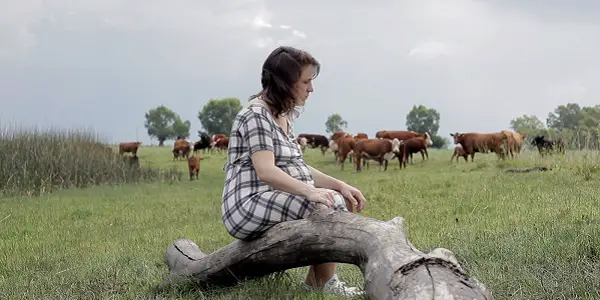TRENQUE LAUQUEN: Building A Mystery

Lee Jutton has directed short films starring a killer toaster,…
A four-hour-plus film told across twelve chapters and screened in two parts, Trenque Lauquen is the kind of film that automatically sounds intimidating — and that’s before the expansive plot begins unfolding, and mysteries begin emerging from within other mysteries like a giant cinematic matryoshka doll. Yet everything that makes filmmaker Laura Citarella’s latest sound borderline inaccessible to audiences is actually what makes it such an all-encompassing and ultimately very rewarding viewing experience.
Secrets and Lies
Co-written by Citarella with lead actress Laura Paredes, Trenque Lauquen focuses on the character that Paredes first portrayed in Citarella’s 2011 film Ostende. That character is also called Laura, making it all too easy to see her as an avatar for the women who have created her — not to mention, as a spiritual descendant of previous legendary Lauras of the screen, including Gene Tierney’s presumed dead advertising exec and Sheryl Lee’s murdered homecoming queen.

This Laura has gone missing, and two men are attempting to figure out where she has gone and why: Rafael (Rafael Spregelburd), the long-term boyfriend who has been preparing a house in Buenos Aires for the two of them to live in, and Ezequiel (Ezequiel Pierri, also the film’s producer), who has served as Laura’s driver and confidant while she has been in Trenque Lauquen. Laura is an academic and botanist who has a university job alongside Rafael waiting for her when she returns from her work categorizing local plants. For these and other reasons, Rafael cannot wrap his mind around why she would have suddenly disappeared. However, Ezequiel has his own ideas of why she might have vanished, if not where she might have gone.

As flashbacks within flashbacks unfold across the various chapters of Trenque Lauquen, we learn that Laura had been obsessed with unraveling the mystery of a series of erotic love letters she found hidden in several books in the local library. The only person she had shared the letters with was Ezequiel, who quickly began to share Laura’s obsession — and, eventually, to develop feelings for her. Ezequiel assumes that this is what has caused her departure, yet he later learns that there is yet another mystery — one with a surprisingly supernatural bent, involving the lake from which the town of Trenque Lauquen takes its name — that may have played an even greater role in Laura’s decision to leave.
Wonderful and Strange
The first part of Trenque Lauquen focuses on the mystery of the letters, the second on the mystery of the lake and a strange apparition that appeared in it one day; but it’s the mystery of Laura herself that runs through the whole film. The more we learn about Laura, the more we realize that everyone else’s impressions of her are based entirely on what they want to believe about her, not on what is actually true. Indeed, for much of the film’s running time, we’re seeing Laura from other people’s perspectives, and asking ourselves the same questions they’re asking about her; it isn’t until the second half, when Ezequiel sits down to listen to a recording Laura made for her friend Juliana (Juliana Muras), that we finally hear her story in her own words and see the events from her point of view. This change in perception ensures that it is the missing woman herself, and not the men searching for her, that remains the central figure in the film; it also cements Trenque Lauquen as a decidedly feminist work.
The second half of the film is also where we meet the enigmatic Elisa (Elisa Carricajo), a scientist who has been investigating the mystery of the lake, and her partner, Romina (Verónica Llinás). As Laura narrates her time with them, and we watch Ezequiel listening to the recording (while listening to it ourselves), and the film ricochets back and forth across time and space, one may feel a tad disappointed that the intense romance of the love letters (and the burgeoning one between Laura and Ezequiel) has been dropped so abruptly. Yet it’s hard to be too nostalgic for that storyline when the new one is as fascinating as this. Both are centered on passion—for physical intimacy, for scientific discovery—that Laura tries to live vicariously through, before realizing that the only way she can live such a passionate life is to seek one out; her obsession with solving these mysteries reflects her need to solve something within herself.

The complicated plot of Trenque Lauquen contrasts sharply with the film’s relatively simple visuals; cinematographer Agustín Mendilaharzu focuses on the landscape and the road, and most of all Laura, allowing them all to speak for themselves without too many unnecessary frills. The film’s musical score, by Gabriel Chwojnik, repeats the main theme enough times over the course of four hours to grow slightly annoying, though by rendering it with a variety of instruments—including the spooky sounds of the theremin — the music takes on different tones and meanings that suit those particular scenes. But all of this takes a backseat to Paredes and her phenomenal performance, which constantly subverts not only the basic tropes of every “missing girl” movie but also our expectations of Laura and what she’ll do next.
Conclusion:
A sprawling tale that crosses multiple genres, including science-fiction, romance, and noir-tinged thriller, Trenque Lauquen is at its heart about a woman trying to find herself. And while that may sound overly simplistic, it’s actually what makes the film so marvelously complex.
Trenque Lauquen opens on April 21, 2023 at Film at Lincoln Center in New York before expanding to additional markets.
Watch Trenque Lauquen
Does content like this matter to you?
Become a Member and support film journalism. Unlock access to all of Film Inquiry`s great articles. Join a community of like-minded readers who are passionate about cinema - get access to our private members Network, give back to independent filmmakers, and more.
Lee Jutton has directed short films starring a killer toaster, a killer Christmas tree, and a not-killer leopard. Her writing has appeared in publications such as Film School Rejects, Bitch: A Feminist Response to Pop Culture, Bitch Flicks, TV Fanatic, and Just Press Play. When not watching, making, or writing about films, she can usually be found on Twitter obsessing over soccer, BTS, and her cat.













